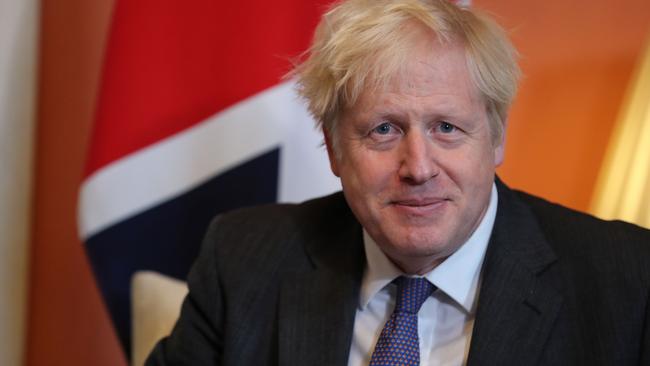Australia risks being ostracised by our allies on climate
Australia is already out in the cold, but wait until Joe Biden and John Kerry get to work...

On climate, we are now diplomatically isolated, and that’s before Joe Biden and his climate envoy John Kerry get to work after January 20.
Where was the Anglosphere solidarity, advisers to the Prime Minister must be asking? All committed to net zero — every one of them, carbon-reliant Canada and our plucky friend across the Tasman most decisively. And Downing Street is Eco-Tory and not for turning.
Sick of being shamed with the loss of face, Japan made the commitment in October.
Climate policy is shifting with dizzying speed.
Was it only two months ago that Canberra rounded on corporate Australia for supporting Paris? In October, ANZ said it would no longer fund new coalmines or power stations. It would work with its 100 largest customers to ensure they had zero emissions plans.
This earnt an enraged attack from three ministers in the federal government. The Deputy Prime Minister Michael McCormack said the bank was “imposing largely Euro-centric standards to satisfy shareholder activists”. Agriculture Minister David Littleproud urged farmers to boycott the bank. Resources Minister Keith Pitt encouraged customers to abandon it.
Today, international pressure on Australia prohibits such effusions. More talk like that just reminds Britain and the US that Australia is now the only developed country refusing to commit to net-zero emissions by 2050.
That’s what the apparent rift with Boris Johnson is all about.
Getting nations to ratchet up their 2015 commitments under the Paris Agreement is the whole purpose of next year’s UN Climate Change Conference Johnson is hosting in Glasgow.
His government wants COP 26 to be a diplomatic triumph for Britain. They need to prove that, out of Europe, Britain’s world leadership is indispensable. This is about Britain’s new international character.

There are grounds for optimism around COP, especially the commitments made in the last three months by Japan and South Korea to net-zero emissions in 2050 and China by 2060. Add the surge of renewable energy in India and the prospect of China next March dumping new coal-fired power from the 14th five-year plan, and you can understand why Johnson only this October put Morrison under pressure to move, behaving towards us like a determined stockman rounding up stragglers.
The Deputy Prime Minister could attack “Euro-centric standards” beating up ANZ but such talk is now strictly verboten as erstwhile cabinet colleague Mathias Cormann seeks the post of OECD secretary-general. The economic policy body of the developed world has 37 members and 25 are European — signed up, by definition, to the forward-leaning environment policies of the European Union.
Cormann will be embarrassed if any of the European ambassadors have learnt that in 2009 he was one of a group of three Coalition senators determined to persuade the Coalition to kill off the Rudd government’s emission trading scheme — and execute their own leader Malcolm Turnbull for supporting it. Or that his first priority as finance minister in 2013 seemed to be to abolish the Clean Energy Finance Corporation.
After Johnson’s hard line on climate this week, Cormann would be unwise to assume British support for the job. Or that of the Biden administration.
In the last months of 2020, so crowded with developments on climate, nothing rivals the drama of Joe Biden’s seven million popular vote victory over pro-coal climate denier Donald Trump. The president-elect has pledged to have America rejoin the Paris Agreement and to introduce new standards for methane — both on day one. He has committed to removing all gas and coal from the US power system by 2035. His economic recovery program will be driven by green investments, his green policies implemented by executive order from the Oval Office not subject to Senate approval.
Biden’s policies are so robust they are little different from those marketed as a Green New Deal in 2019 by the left-leaning representative from New York, Alexandria Ocasio-Cortez. More ominous for the climate resisters in Australia is Biden’s appointment of former secretary of state John Kerry as special presidential envoy for climate. In Obama’s first term he was still serving as chair of the Senate Foreign Relations Committee.
As foreign minister, our embassy got me a meeting with this somewhat aloof figure — who had not deigned to meet our ambassador — based solely on a mutual interest in climate and oceans.
At 77 years of age, Kerry would consider this his last burst of public service. It’s easy to imagine how firm he will be with a US ally that has ministers seeking to punish a bank because its board embraces what is his own climate agenda. Canberra better calculate that he is headed our way.

But even before the November 3 election, big US corporates were galloping away from carbon every bit as decisively as our own ANZ. Just before America voted, there were closures of 9500MW of coal-fired generation by seven separate utilities. They included closures in Wisconsin and Pennsylvania, states that figured big in Biden’s victory. And in Texas, the coal fleet is being retired and renewables exploding — yes, in the Lone Star state which incubated climate denialism and once whooped, “Drill, baby, drill!”
Last month, the International Energy Agency confirmed the plunging price of solar power in Europe, putting the cost at half what it had been only last year. But it went further. The IEA said solar and wind were cheaper in 2019 than they had projected they would be in 2040. The price of renewables is sinking 20 years ahead of expectations.
Was it only last May that the Prime Minister’s manufacturing task force headed by Andrew Liveris proposed a gas-fired recovery? A gauzy endorsement for carbon, it sought government funds to develop gas fields and build and run pipelines, even for government to buy gas and on-sell it at a subsidised price. Reportedly, Treasury revolted at this rent-seeking cornucopia, completely incompatible with Paris targets, let alone those enhancements of Paris that Johnson presses us to make.
Only six months on, the Liveris report looks like a sepia toned fantasy from another age.
Bob Carr is the longest-serving premier of NSW and former foreign minister of Australia. He is Industry Professor of Climate and Business at the University of Technology Sydney.



This week it seems Australia lost the support of its partner, Britain, in winning a speaking slot at this weekend’s UN global summit it is hosting on climate. The reason is our stubborn failure to commit to net-zero emissions by 2050.